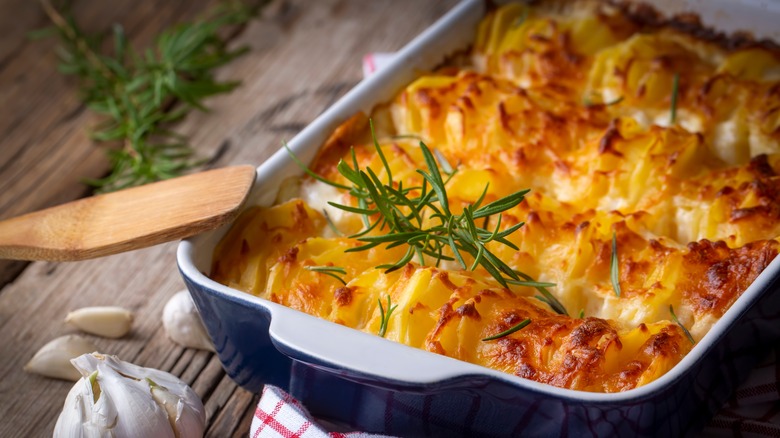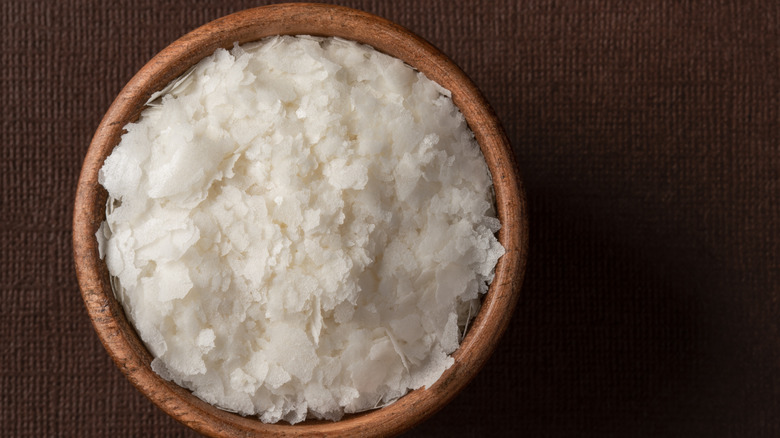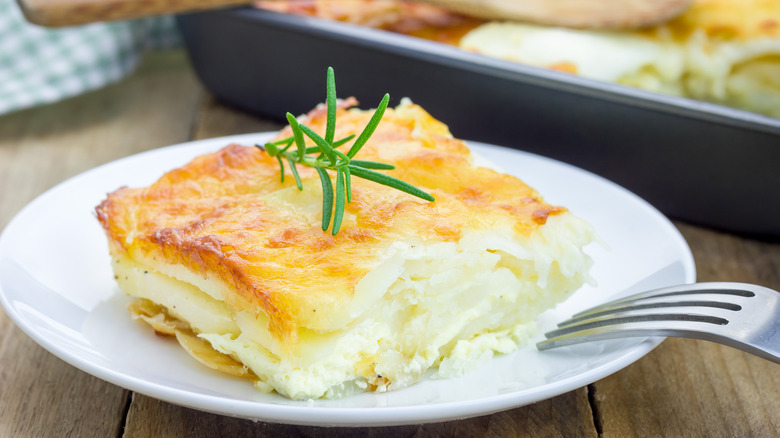Runny Scalloped Potatoes? Just Add Potato Flakes
Scalloped potatoes are an all-star dish appropriate for almost any event. The casserole made with thinly sliced spuds is equally at home on a holiday table as it is at a summer barbecue, and it can go from everyday dinner to a special occasion. You don't even need a lot of kitchen skills to pull them off either, because they're basically just sliced potatoes baked in a white sauce with a little cheese. There are times, though, when even the best recipes go off the rails and your potatoes come out a little runny. This is no reason to panic or start over because all you need to fix a batch of watery scalloped potatoes are some dried potato flakes.
It can be easy to get distracted when you're making dinner, and sometimes you'll measure ingredients wrong. It's no big deal as long as you have some potato flakes on hand because when you shake a few of them into the hot scalloped potato liquid, they'll thicken everything up in seconds and won't change the taste or texture of your dish.
What are potato flakes?
Potatoes are full of starchy goodness, and when you bake them in a rich, white sauce, they absorb a lot of the liquid as those starch molecules expand and gelatinize. Potato flakes (also sold as instant mashed potatoes) are simply cooked, dried, mashed potatoes that have been processed into little flat flakes. They are usually made with russets, which are the starchiest variety, and why they're the best type of potato for many dishes.
Instant mashed potatoes get a bad rap, but typically, if you look at the ingredients list on the back of the package of dried potato flakes, it will simply say "potatoes." They're great to have around when you need a side dish in a hurry, but they really shine as a thickener. As soon as you mix the flakes with anything wet, they will absorb the liquid and expand, which makes them useful for soups, sauces, and, yes ... runny scalloped potatoes.
If you find yourself faced with a soupy pan of potatoes, shake a few tablespoons of flakes into the sauce and mix them around with a fork or a small whisk. The flakes will soak up the extra liquid in a flash, and you can keep adding them until the sauce is at the proper thickness. Because they're simply dried potatoes, they will taste just like the rest of the potatoes in the dish. Don't go overboard, however, or you'll end up with a scalloped-mashed potato hybrid.
Prevent soupy spuds
Rescuing a batch of scalloped potatoes is pretty easy as long as you have the dried flakes on hand. But if you're not in the habit of keeping potato flakes in the pantry, it's important to prevent soupy scalloped potatoes. The best place to start is to always read the recipe and try to choose one that you know will work or has been tested by someone you trust.
Second, if the recipe doesn't specify what type of potatoes to use, always reach for russets. Because they are the starchiest, these potatoes will give you the best chance at achieving the perfect rich and silky scalloped potato sauce.
Finally, don't fill the entire pan with sauce. After you arrange the potatoes in the casserole dish, only pour enough sauce to just cover the potatoes. Sometimes the potatoes will be smaller than those used to create the original recipe, so you'll end up with too much sauce. Don't just dump everything in because the extra liquid won't thicken if there's not enough potato starch.
But if it's too late and you've already got a wobbly batch of potatoes on the stove, simply add a few potato flakes, let them rest for a few minutes to set, and your scalloped potatoes will have the perfect texture.


